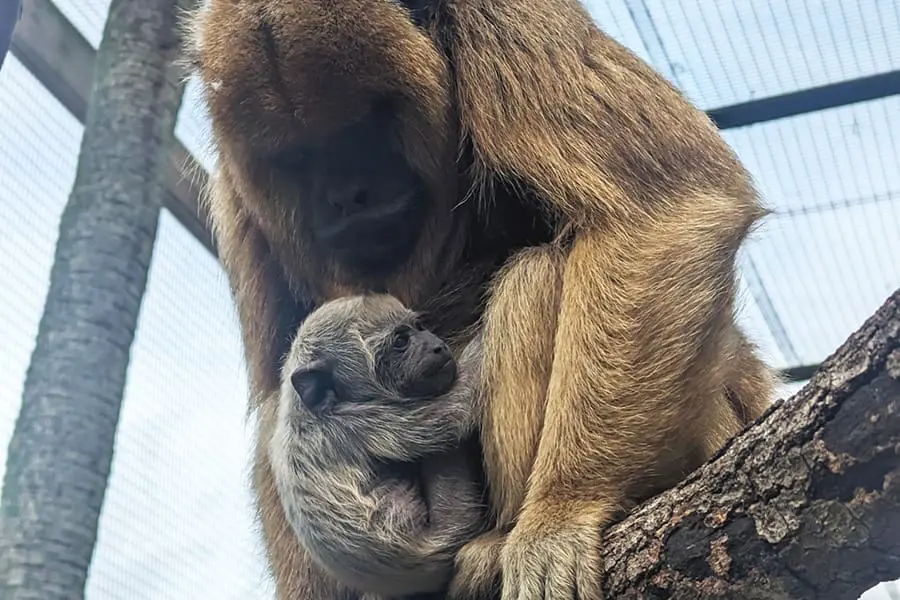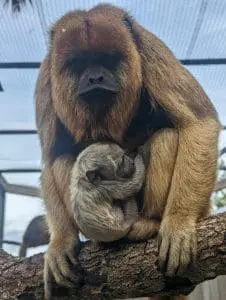

Welcome, little one!
Our black howler monkey troop recently welcomed a new bundle of joy: Baya the howler gave birth on November 29! While we do not yet know the baby’s sex yet, we are delighted to share they and mom are doing well.
“Our new howler baby seems to be very aware and alert, curiously peering at keepers when we are around,” said Rainforest Revealed keeper Grace Scott.
 This young one joins a troop that includes half-sisters Batata and Beatle as well as brothers Bruno and Banjo. Female howler monkeys care for their young for around 12 months. After that, the young stay with their natal group and will continue to be around mom and other family members. We’ve seen other members of the group care for Bruno and Banjo, carrying, grooming and protecting them. We expect this to continue with the newest member.
This young one joins a troop that includes half-sisters Batata and Beatle as well as brothers Bruno and Banjo. Female howler monkeys care for their young for around 12 months. After that, the young stay with their natal group and will continue to be around mom and other family members. We’ve seen other members of the group care for Bruno and Banjo, carrying, grooming and protecting them. We expect this to continue with the newest member.
“They are being very supportive and are giving them time to bond,” said Rainforest Revealed Area Supervisor Michelle Johnston. “The troop have also been seen huddling together in the mornings. Bruno and Banjo interact more with one another, so it is nice that they have each other to play with.”
While every new birth at our Zoo is exciting, this one feels especially special and a little bittersweet for our animal care team, who mourned the passing of the little one’s sire, Stormy, a few months ago.
“While our team is still saddened by the passing of Stormy, we are so glad to have his spirit live on in his newest offspring,” Grace said.
“I’m thankful that we have another baby howler, especially since this once is posthumous from Stormy,” added keeper Kayla Mindel. “It is a wonderful reminder/memento to have of Stormy and to see Banjo and Bruno growing up with their new sibling.”
Baya and her older daughters, Batata and Beatle, came to our Zoo in late 2021 as potential mates for Stormy as a part of the Association of Zoos and Aquariums’ Species Survival Plan (SSP) for their species.
This is Baya’s third birth at our Zoo. Although black howler monkeys are not considered endangered, they are threatened in their natural range due to habitat loss, agricultural development and human hunting. Here are a few tips to help:
- When you drink bird-friendly coffee, you are supporting farms that grow coffee in a way that helps migratory birds – and other forest dwelling animals – live their best lives in healthy habitats!
- E-waste, or electronic waste from old phones, computers, cords and similar products, is one of the fastest growing types of waste in the world, and when not disposed of properly, it can cause environmental harm. Bring your old phones and tablets to Brevard Zoo to recycle through eco-cell! A drop-off point is just outside the Zoo’s front entrance.
Baya and the newborn are currently on habitat in Rainforest Revealed, where they share a large space with their troop as well as macaws, scarlet ibises, river turtles, and roseate spoonbills.
If you’re looking for the baby, you will find him or her on Baya’s chest or back! You might notice that they look a little different than the rest of the troop right now. All infant howler monkeys are born with blonde hair in order to “blend in” with their mothers! If the newborn is a male, their hair will turn black when they are around two-and-a-half years old!
“He/She is much lighter in color than their previous siblings, having silver/blonde hair!” said Grace.
Brevard Zoo is an independent, not-for-profit organization that receives no recurring government funding for our operating costs. Your generous support enables us to continue to serve our community and continue our vital animal wellness, education and conservation programs.
